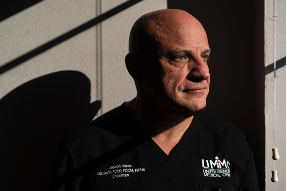Evidence on the importance of gut microbiota for the immune system
Abstract
Vital to the health of the host is maintaining a delicate balance in the immune system by eliminating harmful pathogens while preserving self-tolerance to prevent autoimmunity. By regulating immune homeostasis, the gut microbiota in the gastrointestinal tract provides vital health benefits to its host. It has been demonstrated conclusively that dysbiosis of these gut microbial communities can cause immune dysregulation and autoimmunity. We attempt to examine the relationship between the gut microbiota and the regulation of the innate and adaptive immune homeostasis, which can influence the development of certain disease. This literature review of recently published research and newly discovered scientific information is intended to increase awareness of the importance of maintaining a microbiota balance in the gut for immune health of the host.Downloads
References
Huffnagle, Gary B.; Noverr MC. Chapter 1 : Overview of Gut Immunology. 635th ed. GI Microbiota and Regulation of the Immune System. 2008. 1–14 p.
Acheson DWK, Luccioli S, Mowat AMcI, Ahluwalia B, Magnusson MK, Öhman L, et al. Establishment of The Gut Microbiota in Western Infants. Netto G. KK, editor. Front Immunol [Internet]. 635th ed. 2011 Feb 1;6(1):110–20. Available from: https://pubmed.ncbi.nlm.nih.gov/29453431
Acheson DWK, Luccioli S. Mucosal immune responses. Best Pract Res Clin Gastroenterol [Internet]. 2004;18(2):387–404. Available from: https://www.sciencedirect.com/science/article/pii/S1521691803001495
Mowat AMcI. Anatomical basis of tolerance and immunity to intestinal antigens. Nat Rev Immunol [Internet]. 2003;3(4):331–41. Available from: https://doi.org/10.1038/nri1057
Aagaard Kjersti et al. The Placenta Harbors a Unique Microbiome. Sci Transl Med. 2014;6(237).
Funkhouser LJ, Bordenstein SR. Mom Knows Best: The Universality of Maternal Microbial Transmission. PLoS Biol [Internet]. 2013 Aug 20;11(8):e1001631. Available from: https://doi.org/10.1371/journal.pbio.1001631
Matamoros S, Gras-Leguen C, Le Vacon F, Potel G, de La Cochetiere MF. Development of intestinal microbiota in infants and its impact on health. Trends Microbiol [Internet]. 2013;21(4):167–73. Available from: https://www.sciencedirect.com/science/article/pii/S0966842X12002132
Cherrier M, Eberl G. The development of LTi cells. Curr Opin Immunol [Internet]. 2012;24(2):178–83. Available from: https://www.sciencedirect.com/science/article/pii/S0952791512000325
Maynard CL, Elson CO, Hatton RD, Weaver CT. Reciprocal interactions of the intestinal microbiota and immune system. Nature [Internet]. 2012;489(7415):231–41. Available from: https://doi.org/10.1038/nature11551
Chistiakov DA et al. Intestinal Mucosal Tolerance and Impact of Gut Microbiota to Mocusal Tolerance. Frontier in Microbiology. 2015;5(781):1–9.
Tokuhara D, Kurashima Y, Kamioka M, Nakayama T, Ernst P, Kiyono H. A comprehensive understanding of the gut mucosal immune system in allergic inflammation. Allergology International [Internet]. 2019;68(1):17–25. Available from: https://www.sciencedirect.com/science/article/pii/S1323893018301400
Breban M. Gut microbiota and inflammatory joint diseases. Joint Bone Spine [Internet]. 2016;83(6):645–9. Available from: https://www.sciencedirect.com/science/article/pii/S1297319X16300562
Gensollen T, Iyer SS, Kasper DL, Blumberg RS. How colonization by microbiota in early life shapes the immune system. Science [Internet]. 2016 Apr 29;352(6285):539–44. Available from: https://pubmed.ncbi.nlm.nih.gov/27126036
Bäumler AJ, Sperandio V. Interactions between the microbiota and pathogenic bacteria in the gut. Nature [Internet]. 2016 Jul 7;535(7610):85–93. Available from: https://pubmed.ncbi.nlm.nih.gov/27383983
Natividad JMM, Verdu EF. Modulation of intestinal barrier by intestinal microbiota: Pathological and therapeutic implications. Pharmacol Res [Internet]. 2013;69(1):42–51. Available from: https://www.sciencedirect.com/science/article/pii/S1043661812001946
G. DBM, K. CE, Monica C, Magda M, Glida H, Noah F, et al. Delivery mode shapes the acquisition and structure of the initial microbiota across multiple body habitats in newborns. Proceedings of the National Academy of Sciences [Internet]. 2010 Jun 29;107(26):11971–5. Available from: https://doi.org/10.1073/pnas.1002601107
Aagaard K, Riehle K, Ma J, Segata N, Mistretta TA, Coarfa C, et al. A metagenomic approach to characterization of the vaginal microbiome signature in pregnancy. PLoS One [Internet]. 2012/06/13. 2012;7(6):e36466–e36466. Available from: https://pubmed.ncbi.nlm.nih.gov/22719832
Jakobsson, H. E., Abrahamsson, T. R., Jenmalm, M. C., Harris, K., Quince, C., Jernberg, C., Björkstén, B., Engstrand, L., & Andersson AF. Decreased gut microbiota diversity, delayed Bacteroidetes colonisation and reduced Th1 responses in infants delivered by caesarean section. Gut. 2014;63(4):559–66.
Grzelak T, Woźniak U, Czyżewska K. The influence of natural feeding on human health: short- and long-term perspectives. Prz Gastroenterol [Internet]. 2014;9(1):4–10. Available from: http://europepmc.org/abstract/MED/24868292
Odamaki T, Kato K, Sugahara H, Hashikura N, Takahashi S, Xiao JZ, et al. Age-related changes in gut microbiota composition from newborn to centenarian: a cross-sectional study. BMC Microbiol [Internet]. 2016 May 25;16:90. Available from: https://pubmed.ncbi.nlm.nih.gov/27220822
Spor A, Koren O, Ley R. Unravelling the effects of the environment and host genotype on the gut microbiome. Nat Rev Microbiol [Internet]. 2011;9(4):279–90. Available from: https://doi.org/10.1038/nrmicro2540
Akagawa S, Akagawa Y, Yamanouchi S, Kimata T, Tsuji S KK. Development of the gut microbiota and dysbiosis in children.. Biosci Microbiota Food Health. 2021;40(1):12–8.
Levy M, Kolodziejczyk AA, Thaiss CA, Elinav E. Dysbiosis and the immune system. Nat Rev Immunol [Internet]. 2017;17(4):219–32. Available from: https://doi.org/10.1038/nri.2017.7
Bron PA, van Baarlen P, Kleerebezem M. Emerging molecular insights into the interaction between probiotics and the host intestinal mucosa. Nat Rev Microbiol [Internet]. 2012;10(1):66–78. Available from: https://doi.org/10.1038/nrmicro2690
Broderick NA. A common origin for immunity and digestion. Front Immunol. 2015;6(72):1–3.
Kuhn KA, Stappenbeck TS. Peripheral education of the immune system by the colonic microbiota. Semin Immunol [Internet]. 2013/10/26. 2013 Nov 30;25(5):364–9. Available from: https://pubmed.ncbi.nlm.nih.gov/24169518
Adlerberth I. Establishment of The Gut Microbiota in Western Infants. Acta Pediatrica. 2009;229–38.
Kumar H, Kawai T, Akira S. Pathogen Recognition by the Innate Immune System. Int Rev Immunol [Internet]. 2011 Jan 1;30(1):16–34. Available from: https://doi.org/10.3109/08830185.2010.529976
Peterson DA, Jimenez Cardona RA. Chapter 3 - Specificity of the Adaptive Immune Response to the Gut Microbiota. In: Fagarasan S, Cerutti ABTA in I, editors. Mucosal Immunity [Internet]. Academic Press; 2010. p. 71–107. Available from: https://www.sciencedirect.com/science/article/pii/B9780123813008000034
Hillion S, Arleevskaya MI, Blanco P, Bordron A, Brooks WH, Cesbron JY, et al. The Innate Part of the Adaptive Immune System. Clin Rev Allergy Immunol [Internet]. 2020;58(2):151–4. Available from: https://doi.org/10.1007/s12016-019-08740-1
Levy M, Thaiss CA, Elinav E. Metabolites: messengers between the microbiota and the immune system. Genes Dev [Internet]. 2016 Jul 15;30(14):1589–97. Available from: https://pubmed.ncbi.nlm.nih.gov/27474437
Dugas LR, Lie L, Plange-Rhule J, Bedu-Addo K, Bovet P, Lambert E V, et al. Gut microbiota, short chain fatty acids, and obesity across the epidemiologic transition: the METS-Microbiome study protocol. BMC Public Health [Internet]. 2018;18(1):978. Available from: https://doi.org/10.1186/s12889-018-5879-6
Kelly CJ, Colgan SP. Breathless in the Gut: Implications of Luminal O2 for Microbial Pathogenicity. Cell Host Microbe [Internet]. 2016 Apr 13;19(4):427–8. Available from: https://doi.org/10.1016/j.chom.2016.03.014
Asquith MJ, Boulard O, Powrie F, Maloy KJ. Pathogenic and protective roles of MyD88 in leukocytes and epithelial cells in mouse models of inflammatory bowel disease. Gastroenterology. 2010;139(2):519–29.
Rooks MG, Garrett WS. Gut microbiota, metabolites and host immunity. Nat Rev Immunol [Internet]. 2016;16(6):341–52. Available from: https://doi.org/10.1038/nri.2016.42
Cox MA, Jackson J, Stanton M, Rojas-Triana A, Bober L, Laverty M, Yang X, Zhu F, Liu J, Wang S, Monsma F, Vassileva G, Maguire M, Gustafson E, Bayne M, Chou CC, Lundell D JC. Short-chain fatty acids act as antiinflammatory mediators by regulating prostaglandin E2 and cytokines. World J Gastroenterol. 2009;15(44):5549–57.
Cheng HY, Ning MX, Chen DK, Ma WT. Interactions Between the Gut Microbiota and the Host Innate Immune Response Against Pathogens. Front Immunol [Internet]. 2019;10. Available from: https://www.frontiersin.org/articles/10.3389/fimmu.2019.00607
Yao Y, Jeyanathan M, Haddadi S, Barra NG, Vaseghi-Shanjani M, Damjanovic D, et al. Induction of Autonomous Memory Alveolar Macrophages Requires T Cell Help and Is Critical to Trained Immunity. Cell [Internet]. 2018 Nov 29;175(6):1634-1650.e17. Available from: https://doi.org/10.1016/j.cell.2018.09.042
Negi Shikha et al. Potential Role of Gut Microbiota in Induction and Regulation of Innate Immune Memory. Front Immunol. 2019;10(2441):1–12.
Li Wang, Limeng Zhu SQ. “Gut Microbiota Modulation on Intestinal Mucosal Adaptive Immunity.” J Immunol Res. 2019;2019:10.
Kato L, Kawamoto S, Maruya M, Fagarasan S. The role of the adaptive immune system in regulation of gut microbiota. Immunol Rev. 2014 Jul 1;260:67–75.
Wu, Hsin Jung. Wu E. The role of gut microbiota in immune homeostasis and autoimmunity. Gut Microbes. 2012;3(4–14).
Bunker JJ, Flynn TM, Koval JC, Shaw DG, Meisel M, McDonald BD, et al. Innate and Adaptive Humoral Responses Coat Distinct Commensal Bacteria with Immunoglobulin A. Immunity [Internet]. 2015 Sep 15;43(3):541–53. Available from: https://doi.org/10.1016/j.immuni.2015.08.007
Li H, Limenitakis JP, Greiff V, Yilmaz B, Schären O, Urbaniak C, et al. Mucosal or systemic microbiota exposures shape the B cell repertoire. Nature [Internet]. 2020;584(7820):274–8. Available from: https://doi.org/10.1038/s41586-020-2564-6
Lui JB, Devarajan P, Teplicki SA, Chen Z. Cross-Differentiation from the CD8 Lineage to CD4 T Cells in the Gut-Associated Microenvironment with a Nonessential Role of Microbiota. Cell Rep [Internet]. 2015 Feb 3;10(4):574–85. Available from: https://doi.org/10.1016/j.celrep.2014.12.053
Mazmanian SK, Liu CH, Tzianabos AO, Kasper DL. An Immunomodulatory Molecule of Symbiotic Bacteria Directs Maturation of the Host Immune System. Cell [Internet]. 2005 Jul 15;122(1):107–18. Available from: https://doi.org/10.1016/j.cell.2005.05.007
Mager LF, Burkhard R, Pett N, Cooke NCA, Brown K, Ramay H, et al. Microbiome-derived inosine modulates response to checkpoint inhibitor immunotherapy. Science (1979) [Internet]. 2020 Sep 18;369(6510):1481–9. Available from: https://doi.org/10.1126/science.abc3421
Tan TG, Sefik E, Geva-Zatorsky N, Kua L, Naskar D, Teng F, et al. Identifying species of symbiont bacteria from the human gut that, alone, can induce intestinal Th17 cells in mice. Proceedings of the National Academy of Sciences [Internet]. 2016 Dec 13;113(50):E8141–50. Available from: https://doi.org/10.1073/pnas.1617460113
Wu HJ, Wu E. The role of gut microbiota in immune homeostasis and autoimmunity. Gut Microbes [Internet]. 2012/01/01. 2012;3(1):4–14. Available from: https://pubmed.ncbi.nlm.nih.gov/22356853
Georgiev P, Charbonnier LM, Chatila TA. Regulatory T Cells: the Many Faces of Foxp3. J Clin Immunol [Internet]. 2019;39(7):623–40. Available from: https://doi.org/10.1007/s10875-019-00684-7
Atarashi K, Tanoue T, Shima T, Imaoka A, Kuwahara T, Momose Y, et al. Induction of colonic regulatory T cells by indigenous Clostridium species. Science [Internet]. 2010/12/23. 2011 Jan 21;331(6015):337–41. Available from: https://pubmed.ncbi.nlm.nih.gov/21205640
Faith JJ, Ahern PP, Ridaura VK, Cheng J, Gordon JI. Identifying Gut Microbe–Host Phenotype Relationships Using Combinatorial Communities in Gnotobiotic Mice. Sci Transl Med [Internet]. 2014 Jan 22;6(220):220ra11-220ra11. Available from: https://doi.org/10.1126/scitranslmed.3008051
Blumberg RS. Inflammation in the Intestinal Tract: Pathogenesis and Treatment. Digestive Disease. 2009;27:455–64.
Powell N, Pantazi E, Pavlidis P, Tsakmaki A, Li K, Yang F, et al. Interleukin-22 orchestrates a pathological endoplasmic reticulum stress response transcriptional programme in colonic epithelial cells. Gut [Internet]. 2020 Mar 1;69(3):578 LP – 590. Available from: http://gut.bmj.com/content/69/3/578.abstract
Ohnmacht C, Park JH, Cording S, Wing JB, Atarashi K, Obata Y, et al. The microbiota regulates type 2 immunity through RORγt+ T cells. Science (1979) [Internet]. 2015 Aug 28;349(6251):989–93. Available from: https://doi.org/10.1126/science.aac4263
Chu H, Khosravi A, Kusumawardhani IP, Kwon AHK, Vasconcelos AC, Cunha LD, et al. Gene-microbiota interactions contribute to the pathogenesis of inflammatory bowel disease. Science (1979) [Internet]. 2016 May 27;352(6289):1116–20. Available from: https://doi.org/10.1126/science.aad9948
Godefroy E, Alameddine J, Montassier E, Mathé J, Desfrançois-Noël J, Marec N, et al. Expression of CCR6 and CXCR6 by Gut-Derived CD4+/CD8α+ T-Regulatory Cells, Which Are Decreased in Blood Samples From Patients With Inflammatory Bowel Diseases. Gastroenterology [Internet]. 2018 Oct 1;155(4):1205–17. Available from: https://doi.org/10.1053/j.gastro.2018.06.078
Caruso R, Lo BC, Núñez G. Host–microbiota interactions in inflammatory bowel disease. Nat Rev Immunol [Internet]. 2020;20(7):411–26. Available from: https://doi.org/10.1038/s41577-019-0268-7
Fan Y, Pedersen O. Gut microbiota in human metabolic health and disease. Nat Rev Microbiol [Internet]. 2021;19(1):55–71. Available from: https://doi.org/10.1038/s41579-020-0433-9
Ward D V, Scholz M, Zolfo M, Taft DH, Schibler KR, Tett A, et al. Metagenomic Sequencing with Strain-Level Resolution Implicates Uropathogenic E. coli in Necrotizing Enterocolitis and Mortality in Preterm Infants. Cell Rep [Internet]. 2016/03/17. 2016 Mar 29;14(12):2912–24. Available from: https://pubmed.ncbi.nlm.nih.gov/26997279
Levine MM, Nasrin D, Acácio S, Bassat Q, Powell H, Tennant SM, et al. Diarrhoeal disease and subsequent risk of death in infants and children residing in low-income and middle-income countries: analysis of the GEMS case-control study and 12-month GEMS-1A follow-on study. Lancet Glob Health [Internet]. 2019/12/18. 2020 Feb;8(2):e204–14. Available from: https://pubmed.ncbi.nlm.nih.gov/31864916
Qin F, Wu H, Li X, Han J. Correlation between changes in gut flora and serum inflammatory factors in children with noninfectious diarrhea. Journal of International Medical Research [Internet]. 2020 Jan 1;48(1):0300060519896154. Available from: https://doi.org/10.1177/0300060519896154
Fujimura KE, Lynch S V. Microbiota in allergy and asthma and the emerging relationship with the gut microbiome. Cell Host Microbe [Internet]. 2015 May 13;17(5):592–602. Available from: https://pubmed.ncbi.nlm.nih.gov/25974301
Sokolowska M, Frei R, Lunjani N, Akdis CA, O’Mahony L. Microbiome and asthma. Asthma Res Pract [Internet]. 2018 Jan 5;4:1. Available from: https://pubmed.ncbi.nlm.nih.gov/29318023
van Nimwegen FA, Penders J, Stobberingh EE, Postma DS, Koppelman GH, Kerkhof M, et al. Mode and place of delivery, gastrointestinal microbiota, and their influence on asthma and atopy. Journal of Allergy and Clinical Immunology [Internet]. 2011 Nov 1;128(5):948-955.e3. Available from: https://doi.org/10.1016/j.jaci.2011.07.027
Arrieta MC, Sadarangani M, Brown EM, Russell SL, Nimmo M, Dean J, et al. A humanized microbiota mouse model of ovalbumin-induced lung inflammation. Gut Microbes [Internet]. 2016/04/26. 2016 Jul 3;7(4):342–52. Available from: https://pubmed.ncbi.nlm.nih.gov/27115049
Arnold IC, Dehzad N, Reuter S, Martin H, Becher B, Taube C, et al. Helicobacter pylori infection prevents allergic asthma in mouse models through the induction of regulatory T cells. J Clin Invest [Internet]. 2011 Aug;121(8):3088–93. Available from: https://pubmed.ncbi.nlm.nih.gov/21737881
Durack J, Kimes NE, Lin DL, Rauch M, McKean M, McCauley K, et al. Delayed gut microbiota development in high-risk for asthma infants is temporarily modifiable by Lactobacillus supplementation. Nat Commun [Internet]. 2018 Feb 16;9(1):707. Available from: https://pubmed.ncbi.nlm.nih.gov/29453431
Sokol H, Pigneur B, Watterlot L, Lakhdari O, Bermúdez-Humarán LG, Gratadoux JJ, et al. Faecalibacterium prausnitzii is an anti-inflammatory commensal bacterium identified by gut microbiota analysis of Crohn disease patients. Proc Natl Acad Sci U S A [Internet]. 2008/10/20. 2008 Oct 28;105(43):16731–6. Available from: https://pubmed.ncbi.nlm.nih.gov/18936492
Wold AE. The hygiene hypotheslis revised: is the rising frequency of allergy due to changes in the intestinal flora? Allergy. 1998;53:20–5.
Sjögren YM, Tomicic S, Lundberg A, Böttcher MF, Björkstén B, Sverremark-Ekström E, et al. Influence of early gut microbiota on the maturation of childhood mucosal and systemic immune responses. Clinical & Experimental Allergy [Internet]. 2009 Dec 1;39(12):1842–51. Available from: https://doi.org/10.1111/j.1365-2222.2009.03326.x
Penders J, Thijs C, Vink C, Stelma FF, Snijders B, Kummeling I, et al. Factors Influencing the Composition of the Intestinal Microbiota in Early Infancy. Pediatrics [Internet]. 2006 Aug 1;118(2):511–21. Available from: https://doi.org/10.1542/peds.2005-2824
Guénolée P, Ismail F, Sophie P. Effect of Probiotic Bacteria on Induction and Maintenance of Oral Tolerance to β-Lactoglobulin in Gnotobiotic Mice. Clinical and Vaccine Immunology [Internet]. 2003 Sep 1;10(5):787–92. Available from: https://doi.org/10.1128/CDLI.10.5.787-792.2003
Shi, Hai Ning. Walker Allan. Bacterial colonization and the development of intestinal defences. Can J Gastroenterol. 2004;18(8):493–500.
Submitted
Copyright (c) 2023 Juwalita Surapsari, Molly Dumakuri Oktarina, Tonny Sundjaya, Erika Wasito

This work is licensed under a Creative Commons Attribution 4.0 International License.
World Nutrition Journal provides immediate open access to its content under the Creative Commons Attribution License (CC BY 4.0). This permits unrestricted use, distribution, and reproduction in any medium, provided the original work is properly cited.













